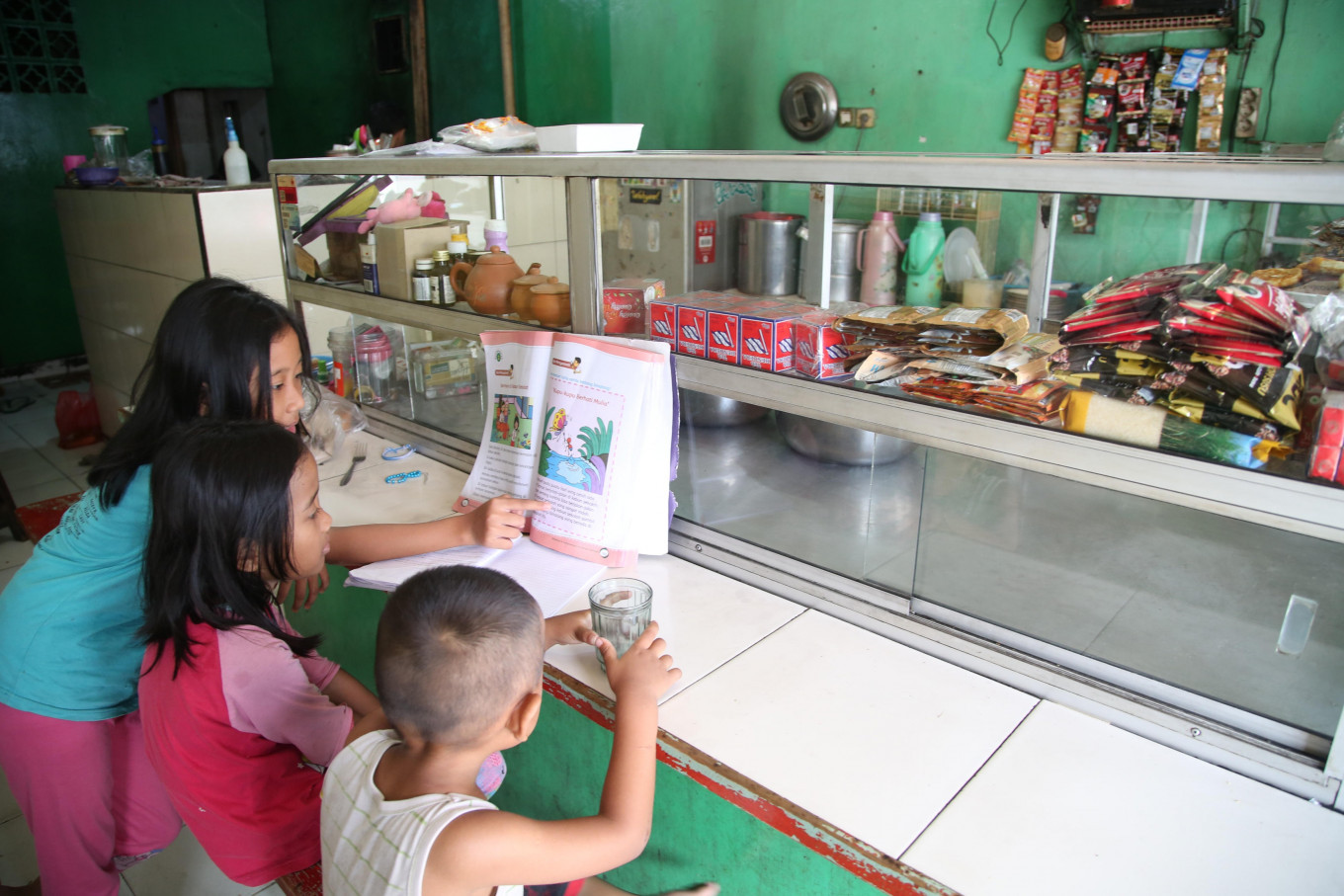Popular Reads
Top Results
Can't find what you're looking for?
View all search resultsPopular Reads
Top Results
Can't find what you're looking for?
View all search resultsCOVID-19: How will it affect human capital?
Another major challenge with online learning is the digital divide, which refers to unequal access to technology, both to devices and internet access, between communities.
Change text size
Gift Premium Articles
to Anyone
 Mesa (left), a fifth grader, helps her younger sister Shafa (center) study for school at their parent’s food stall in Pinang Ranti, East Jakarta, on Friday, April 3, while their 4-year-old brother Eland looks on. The spread of COVID-19 has forced millions of Indonesians to work and study from home. (JP/P.J.Leo)
Mesa (left), a fifth grader, helps her younger sister Shafa (center) study for school at their parent’s food stall in Pinang Ranti, East Jakarta, on Friday, April 3, while their 4-year-old brother Eland looks on. The spread of COVID-19 has forced millions of Indonesians to work and study from home. (JP/P.J.Leo)
A
s COVID-19 continues to spread, countries around the globe are implementing measures to contain the pandemic, from mass testing to national quarantines and physical distancing. This has forced the cancellation of travel as well as the paralysis of economic activities both on the supply and demand sides. Consequently, the economic downturn has been fairly straightforward, as many analysts expected.
Global economic growth is predicted to fall to zero percent this year, according to Bloomberg. While many are focusing on the possible economic damage mounting in countries across the world, one side effect of the pandemic is often overlooked: education, one of the major drivers of human capital development.
Following governments’ calls to limit public activities, there are currently 188 countries that have totally closed schools and just a few countries, like the United States, Australia and Canada, that have mandated localized school closures in response to the outbreak, according to UNESCO.
In Indonesia, around 68 million children and youth have been affected by school closures. This comprises roughly 5 million pre-primary school students, 29 million primary school students, 25 million lower and senior high school students and 8 million tertiary students. This, in turn, has raised concerns among governments, teachers and parents over the continuation of students’ education during the pandemic.
To address this challenge, many governments have introduced distance learning programs to allow students to continue studying from home. In Indonesia, the Education and Culture Ministry has launched the websites https://guruberbagi.kemdikbud.go.id and https://belajar.kemdikbud.go.id to facilitate online learning during the pandemic.
While many believe online learning is an alternative solution, it appears the platform delivers suboptimal learning outcomes. First, because of the suddenness of the outbreak, an online learning system was implemented on a massive scale without adequate testing and preparation in terms of infrastructure, such as computers, smartphones, internet speed, as well as the human capacity, both of teachers and students, to carry out online learning.
A 2020 study by Burgess and Sievertsen revealed that many teachers and students around the world have used a process of trial and error to work out how best to carry out online learning during this pandemic, leading to a potential short-term disruption to the learning and evaluation processes.
Second, some literature also indicates that online learning could potentially lead to suboptimal learning outcomes. Students might learn less during the distance learning period because of several factors, such as a lack of self-motivation to learn independently or mild learning difficulties, such as attention deficit disorders etc. For instance, a 2017 study from Widjaja and Chen indicated that a student’s motivation to learn was strongly associated with successful online learning.
Thus, what can we do to support optimal online learning? The role of parents matters, as parents can accompany and supervise their children during their studies. Without this supervision, children will potentially learn less, which could have long-term consequences stemming from gaps in their knowledge and lack of skills.
Another major challenge with online learning is the digital divide, which refers to unequal access to technology, both to devices and internet access, between communities. For students from marginalized families, having access to the internet and digital devices is a privilege. In Indonesia, around a third (33.78 percent) of all households were not digitally connected in 2018, according to Statistics Indonesia. This number is even higher in rural areas, where only half of all households (51.9 percent) have access to the internet.
The high number of households in rural areas that lack access to the internet will impact the outcomes of online learning for students in these areas. Children that live in households that do not have access to the internet and digital devices will struggle in their academic performance. Here, we have not even talked about differences in internet speed in different regions yet, which will also result in differing learning outcomes between households, increasing the likelihood of inequality in human capital.
In Indonesia, the current school drop-out rate is higher in rural areas, with male students more likely to leave school, according to a study by the Education and Culture Ministry. The current pandemic has certainly given them more reason to look for work, as the impacts are more severe for lower income families. The “study at home” policy could then exacerbate the problem by increasing the number of students that drop out of the formal education system once they become accustomed to working.
What we can do?
From the teachers’ perspective, communicating regularly with parents and students, particularly underprivileged pupils, is crucial, to ensure the students stay and learn at home. Moreover, providing additional books for poor students would be helpful. From the government’s perspective, as Rp 110 trillion of the Rp 405 trillion in additional budget spending will be allocated to the poor through social safety net programs, the additional funds will boost the amount received through the Family Hope Program (PKH) by 25 percent annually.
This increased budget could also be used to facilitate online learning for children from as many as 10 million underprivileged families if managed properly. Although it is arguably not much as an annual sum, the increased funds could be used to pay for monthly internet quotas for online learning. Hopefully, we will get through this pandemic without any major disruptions to our human capital development.
***
Wahyu Wisnu Wardana is the managing director of the Research Institute of Socio-Economic Development (RISED) in Surabaya, East Java, and a lecturer in the School of Economics at Airlangga University. Liza Setya Eka Hasul is a staff member at the Office of the Coordinating Economic Affairs Minister.








